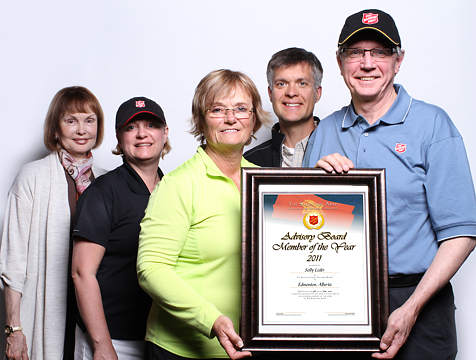Extraordinary Canadians

For 44 years, in both Canada and internationally, Salvation Army officers/pastors Colonels Robert and Marguerite Ward improved lives and gave new hope to society’s most vulnerable. Their key voices brought about positive change in policy, attitudes, and behaviour relating to critical social issues.
The Wards entered honourable retirement in May 2013 and SalvationArmy.ca met with Colonel Bob, who shared some of their story.
Tell us about your journey as officers.
In our early days we pastored churches in Ontario and Saskatchewan. After seven years in this form of ministry, we travelled to Pakistan to manage a Salvation Army residential school for boys who had been orphaned, abused or neglected.
Four years later, Marguerite, then age 35, was diagnosed with a brain tumour. Doctors recommended we return to Canada for surgery, where the tumor was successfully removed and follow-up care was put in place.
For the next 17 years, in Canada, I studied hospital administration and other related topics, and we worked in Salvation Army health services.
This training and experience lead us to Capetown, South Africa, where I administered the Army’s Booth Memorial Hospital, a geriatric facility. Marguerite was a hospital chaplain and also managed the Army’s Carehaven Shelter for abused women and children.
Then, following a brief time in Chicago overseeing Salvation Army programs we were deployed to Pakistan to help heal and rebuild the Army world after the tragic and sudden death of its national leader.
More than half of your service with The Salvation Army was overseas. What prompted you to leave a comfortable life to work in unstable situations?
As young officers Marguerite and I showed interest in the Army’s international work. It never occurred to us to go overseas as missionaries. When we received a letter asking us to consider ministry in a developing nation, we said if the Army needs us, we’ll go.
How did you impact positive change?
We valued our many opportunities to be agents of change in society. For example, as hospital administrator in St. John’s, N.L. , I served on boards at the provincial level where I had a voice in the restructuring of specialized hospital services like OB/GYN. This led to a centralized and more inclusive service for moms and at-risk moms.
In Capetown we arrived in post-apartheid South Africa where coloured poverty and white privilege remained entrenched. At the hospital hard jobs were run by the coloured, and soft jobs by the whites. Health care catered to high, and middle-income earners.
At the time the hospital provided security to the frail, white, elderly population. Focus and structure had to change. I was involved nationally, and helped develop and implement policy that reflected the values of inclusion and fairness. As a result, Booth Hospital now offers rehab, respite, and palliative services to the total elderly population.
Meanwhile, Marguerite was a member of the national domestic violence committee where she worked with police and other churches to expand services at the Carehaven shelter that included counselling, advocacy and education. She was also a voice on the national aids advisory committee that worked to prevent or effectively treat HIV.
What’s next?
While we are technically retired, we look forward to fresh opportunities and overseeing the Army’s shelter services in Hamilton, Brantford and Oakville, Ont. Based on our international service we can have a bearing on social issues facing Canada today.
But before that I want nothing more than to enjoy a Tim’s coffee and a couple of good doughnuts—a Dutchie and a Boston Cream.
Photo: Colonels Robert and Marguerite Ward receive Capetown Rotary Club’s Paul Harris award for outstanding contribution and exceptional service in the community.


